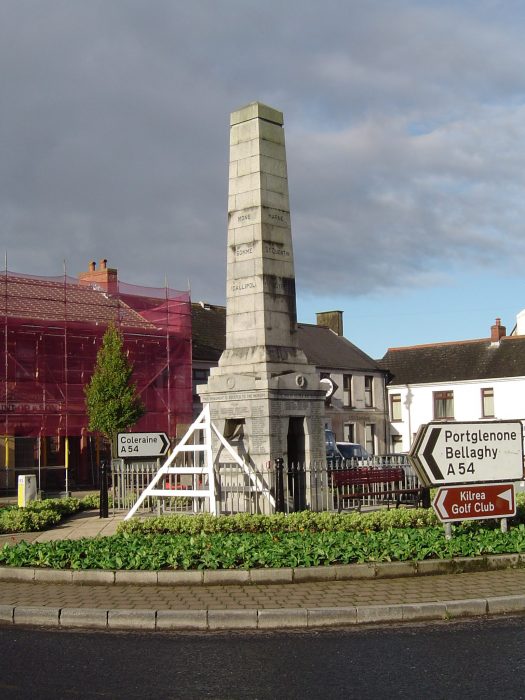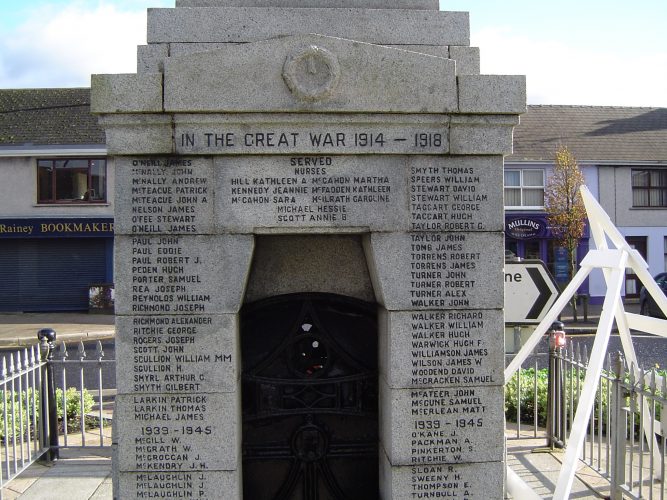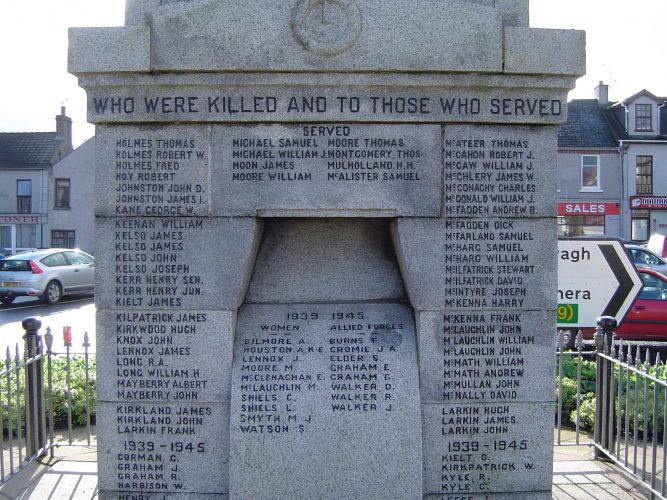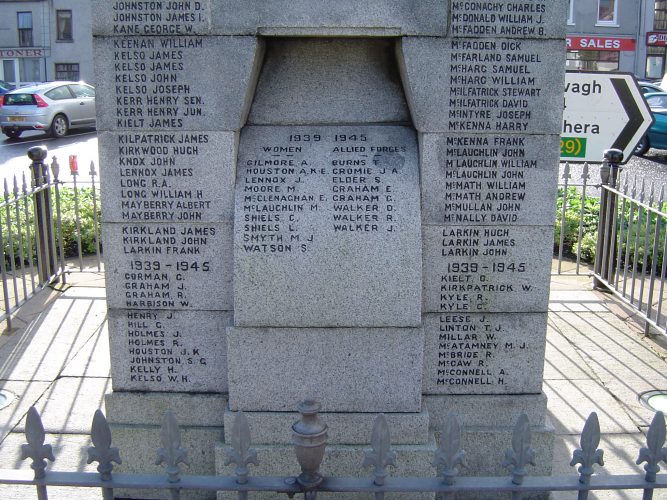This page contains four images, the names of the FALLEN, details of the unveiling and dedication ceremony and background information on the Memorial. Other images of the Memorial are available on request.

The Diamond, KILREA, Co. Londonderry.
The Names of the FALLEN
Thomas Adams
Robert Alexander
Robert Armstrong
Joseph L. Bamford
Daniel Bland
Thomas Bolton
Robert Carleton
Thomas Carpenter
Patrick Diamond
John Donnelly
John Gamble
Robert Gilmour
Wm. Gilmour
Robert J. Gordon
Robert Graham
David Graham
Andrew Hegarty
James Holmes
James Hogg
Archibald Hogg
Robert J. Kennedy
George Kirkland
James H. Knox
Archie Laughlin
Eddie Lennox
Samuel Loughry
Robert McCahon
John McCotter
Alexander McDonald
Robert McIlrath
Thomas J. McMath
James McMullan
John McMullan
Alexander Michael
Albert E. Murphy
Allston Neely
William Patton
Archibald Patton
David W. Ritchie
William Richmond
Samuel Rowe
John Rowe
James Stewart
Robert Stewart
Jack Stewart
John M. Torrens

Kilrea War Memorial.
IMPRESSIVE UNVEILING CEREMONY.
ELOQUENT AND TOUCHING SPEECHES.
In beautiful sunshine and before a very large gathering in the Diamond, Kilrea, the handsome obelisk erected in memory of those from the town and surrounding district who fell or served in the Great War was gracefully unveiled on Wednesday by Lady Anderson, wife of Sir Robert Anderson, M.P., Londonderry.
The obelisk, which stands some 24 ft. high, is of Newry granite and occupies a position over the historic pump, which in former days was the scone of contention between rival political sections, who, particularly on festival occasions, endeavoured to placed upon it party emblems. Portion of the old pump, however, remains at the base of the obelisk and the latter now stands as a symbol of unity, since men whom it commemorates were one in the service of King and Country and embraced every creed and class of the community.
The memorial bears the following inscription, – “This memorial is erected to the men of Kilrea and district who were killed and to those who served in the Great War, 1914 – 18.” It also contains the names of the following places where Kilrea men served: -Marne, St. Quentin, Egypt, Mons, Somme, Gallipoli, Ypres, Messines, Palestine, Aisne, Guillemont, and Macedonia. Mr S. J. McFadden, architect, Coleraine, prepared the plans.
The committee responsible for the erection of the memorial were- Mr W. J. Smith, Co.C., (chairman), Miss Clark, Miss Gilmore, Messrs James Shiels (Arcade), James Shiels (Church Street), John Scullion, John McCahon, jun., W. S. Cromie, Hugh McIlrath, R.D.C., W. J. Killough, David Adams, Richard McFadden, James Mitchell, William McAllister, Alex Knox, Joseph Rea, Samuel McIlrath, R. Elder, James A. Campbell, John Smyth, James Hunter, William Wallace, J. Wilson, Joseph Dickie, and Robert Patterson. Mr George Kidd energetically carried through the duties of secretary, and Mr Robert Peden that of treasurer.
On the Platform.
Mrs Chichester, O.B.E., J.P., M.P., presided and was accompanied on the platform by Lady Anderson, Miss Anderson, Miss Clark, Mrs Lennox, Mrs Hilton, Mrs. Dickie, Revs W. J. Hill, W. J. Jamison, J. A. Boyd, Hans Hadden, Wm. Bigley, and R. W. W. McQuaide, Commander Chichester Clark, D.S.O., Captain J. Wilson Kennedy, M.C., D.L., Dr S. J. Bolton, J.P., Dr H. S. Morrison, D. L., M.P., Sir Robert N. Anderson, D. L., M.P., Messrs A. Wallace Clark, D. L., Harry Clark, James McLaughlin, H. A. McIlrath, J.P., George Kidd, J.P., W. J. Hilton, J.P., etc.
Rev. W. J. Hill opened the proceedings with prayer, and a choir representative of the Parish Church and the two local Presbyterian Churches, under the leadership of Mr Samuel Craig, with Miss Knox as accompanist, afterwards led in the singing of “O, God our help in ages past.”
Mrs Kidd announced the receipt of apologies for inability to be present from Sir James and Lady Craig, the Hon Sir Malcolm and Lady Macnaughton, Sir Robert Lynn, M.P., Major R.C. Smythe, Officer Commanding Royal Inniskilling’s-Irish Fusiliers, Omagh: Captain C.E. Stronge, D.L., and Captain Norman and Mrs Stronge.
Mrs Chichester’s Speech.
Mrs Chichester said she did not know what lay in the minds of those who had selected two women to act respectively as chairman and unveiler at that memorial ceremony. It was not a usual occurrence, but her interpretation of it was that it was felt that they who were not able to play a part in the great game which the men, whose names they were honouring that day, played so well, that they who could not serve as those other women served whose names were on the obelisk, that they whose duty lay at home and who could take no shared in their country’s defence and in their country’s glory, might be given an opportunity that day of paying a last tribute to those who so nobly and so gallantly defended their Empire and their homes. She spoke for herself and also, she knew, for Lady Anderson, when she said they were not present that afternoon because of any connection they might have with politics or politicians. Politics had been left behind on that occasion. (Hear, here). Distinctions of creed, distinctions of class and political differences were now effaced as they were effaced on the battlefield. They came there as women glorying with some and sorrowing with other women as citizens of our great Empire and prouder perhaps, if possible, than ever before of the citizenship because of the great deeds done by their men who defended that Empire and who came from that district. Time was the great healer, and it was well that it should be, but it could never efface or obliterated the gratitude which they owed to the men whose names were on that memorial, their pride in their achievements, their sorrow for those who gave all and who never returned, and their compassion for those who offered all and were now broken and maimed for life. In this connection she referred to one man by name because she knew him well. Broken and maimed he, on coming back to Kilrea, continued to do his duty nobly, serving and working on various committees established for the purpose of helping the ex-servicemen of that country. She alluded to Sgt Adams. He had paid the ???????? price, after great suffering, there in that quiet little town, far from the thunder of the guns, and long after the thunder of the guns had ceased. She would also like to be refer in particular to the battle of which that day was the anniversary. She knew that on that memorial there were the names of men who did gallant deeds in every quarter of the world, but that day was the anniversary of a battle in which their Derry volunteers played so great a part. And standing there that day they, in the words of an Ulster poetess, saw a vision of those sun-baked fields of Picardy of nine years ago.
There, tenderly the morning breeze
Ruffles the ripening corn;
There-calm as fate- soldiers of Ulster bide
their time and wait,
Under the Thiepval trees.
The regiments of her fusiliers are there,
Her engineers and riflemen,
From lake and hill and lonely Antrim glen
And Derry’s volunteers.
Heaven for a moment – Heaven then hell;
Into the sunshine yellow on the grass,
With brows uplifted, stern-lipped, glad they passed
To shot and splitting shell.
Continuing, Mrs Chichester said they passed on and our minds refused to follow. Passed on to death and they had left behind them an perishable memory. They added lustre forever to the name of Derry.
Mrs Chichester then called upon Lady Anderson to perform the unveiling ceremony.
The Unveiling Ceremony.
Lady Anderson thanked them most sincerely for the honour they had conferred upon her in asking her to unveil their War Memorial. She thanked the many gallant men of Kilrea and district who, in answer to the call King and Empire, volunteered for service during the Great War. She joined reverently with them that day in their service of commemoration for those who were called upon to make the supreme sacrifice, and who in the bright days of their early manhood laid themselves and their all on the altar of patriotism. The British Empire, of which they were all proud to be a part, had no cause to be ashamed of her Ulster sons, for their loyalty and devotion were well known the world over, and their courage and daring and gallant services during the Great War were unsurpassed. On that day-the anniversary of the Battle of the Somme-it was most appropriate that they in Ulster should meet to render their homage to those who by their bravery and self-sacrifice had added so greatly to the glory and honour of their Imperial Province. The town and district of Kilrea, in sending so many of there best to the battle-line in the fight for justice and liberty, nobly did their part for God and the Empire. Their people and generations to come after them could proudly point to their War Memorial and say, “We are the sons of those who willingly served and gave of their best lifeblood in its defence.”
Lady Anderson then release the Union Jack which hung about the memorial, and said; –
“To the glory of God and in undying and affectionate remembrance of the gallant men of this town and district who served and who made the supreme sacrifice during the Great War, I reverently unveil this War Memorial. May the memory of their noble deeds be a never dying inspiration in the long years to come.”
Following the unveiling, Bugler S. Platt, Coleraine, sounded “The Last Post” and after the hymn, “How bright these glorious spirits shine,” had been sung by the choir, sounded the “Reveille.”
The Names of the Fallen.
Commander Clark, in tones which reached the extreme ends of the large assemblage, read the names of the fallen as follows; –
Thomas Adams, Robert Alexander, Robert Armstrong, Joseph L. Bomford, Daniel Bland, Thomas Bolton, Robert Carleton, Thomas Carpenter, Patrick Diamond, John Donnelly, John Gamble, Robert Gilmour, Wm. Gilmour, Robert J. Gordon, Robert Graham, David Graham, Andrew Hegarty, James Holmes, James Hogg, Archibald Hogg, Robert J. Kennedy, George Kirkland, James H. Knox, Archie Laughlin, Eddie Lennox, Samuel Loughry, Robert McCahon, John McCotter, Alexander McDonald, Robert McIlrath, Thomas J. McMath, James McMullan, John McMullan, Alexander Michael, Albert E. Murphy, Allston Neely, William Patton, Archibald Patton, David W. Ritchie, William Richmond, Samuel Rowe, John Rowe, James Stewart, Robert Stewart, Jack Stewart, and John M. Torrens.
Mr George Kidd read the names of close on three hundred men and eight nurses whose service in the war is also thus recorded.
Commander Clark said he looked upon the war from the point of view of the soldier and sailor, and consequently it was not for him to talk about the deeds of the men, although he could tell some wonderful and heroic tales. He wished to congratulate the people of Kilrea and district on the erection of such a beautiful memorial. It was handsome and fitting and was on a well chosen site, and he thought it emphasised the appreciation of the men who made the supreme sacrifice and those who served their country. It also showed the spirit to serve the Empire still lived, and would show to the generations to come what their fathers had done.
Dr Morrison and Kilrea.
Dr H.S. Morrison congratulated the people of Kilrea on the splendid record of its young people in the great war, and the memorial just unveiled which would perpetuate their courage and inspire coming generations to discharge if necessary the highest duty of citizenship, namely, national defence. It would not be thought invidious if he mentioned two cases. One was Captain Bamford. He knew his father well and his mother from his school days. His (the speaker’s) two sons were out in Siberia and Bulgaria at the same time and they had told him facts of Bamford’s service. He and an officer called Green were the finest flying men with the British forces. Skilful regardless of danger, and the constant dread of German and Bulgarian troops. They were in every way top-hole men, and admired and respected by everybody. Too daring in the end the German aircraft gunners got Bamford, but they gave him a military funeral as their tribute of respect to a brave enemy. During the war when crossing from Liverpool to Belfast he met a New Zealand officer, who had lost an eye, and who had a piece of steel in the other eye. He had been through the fighting and owning to his wounds had been discharged and was coming to Kilrea to visit some of his mother’s relations.
Continuing, Dr Morrison, said 50 years ago there were three County Derry magistrates on the Kilrea bench. Mr Dolling of the Manor House was chairman. He invariably sent for his (the speaker’s) father when any special trouble arose in Kilrea. His father took him and he sat on the bench behind the justices and listened to John Ray and Mr Ward, and the crown conducting cases of rioting and bloodshed. The Diamond and Pump, each party striving for mastery, the personal injuries, pecuniary loss and destruction of property, and the bitterness engendered did great injury. More recently a better spirit was visible and he had some part in public expressions of approval when men of diverging schools of thought met to congratulate their neighbour on receiving some public honour. At the opening of the Orange Hall he ventured to commend the new spirit and urged that all of them who guided any party should support this charitable spirit and identify themselves with whatever things were true and just and pure and of good report, to stand fast by the individual principles and loyalty to one’s party, but to do it by reason and argument and example. He thought they were now doing that, when in recent years many parts of County Derry were deluged in blood and arson and violence of all kinds, whilst in Garvagh, Kilrea and Agivey all was normal. They had, he hoped, turned their back on the old and vicious and bad and now it was the duty of all to “ring out the old, ring in the new; ring out the false, ring in the true; ring out old forms of party strife, ring in the nobler forms of life.” (Applause).
Sir Robert Anderson’s Tribute.
Sir Robert Anderson, M.P., said he considered it a proud privilege to have the opportunity of joining in that ceremony. They had met there to honour the men who had been willing to pay the great price; men who had fought for liberty, justice and righteousness. That memorial in the centre of Kilrea was something which would perpetuate the memory in the days to come of the men and women who were not afraid to go forth and do their duty to King and Country. (Applause). They honoured them and also those who mourned them, for their names would live forever. They would always live in the hearts and affection of the people. The 1st July anniversary would never be forgotten in the homes of Ulster people, and coming as he did from the old historic city of Derry, he could not help recalling that the men, as of yore, as they went over the top to face the foe shouted the old historic watch word- “No Surrender.” It was a delightful thing to know that they did not meet there as politicians, but all creeds and classes meeting together in unity. He rejoiced in having that opportunity of taking part in the ceremony and congratulated, sincerely and heartily, the people of Kilrea and surrounding district who had erected the memorial, showing how much they appreciated the sacrifice of the past years. He hoped and trusted that the memorial would be an inspiration and strength to succeeding generations, and that their country’s troubles, had come to an end and that they would long have peace to live and served their country.
Rev J.R. Boyd, a former chaplain to the forces at the Curragh, having dedicated the memorial, the hymn “For all the Saints” was sung, after which Mr H. A. McIlrath, J.P., on behalf of the committee, proposed a vote of thanks to Lady Anderson, for coming such a long way to unveil the memorial. They were naturally proud of their memorial, but they were doubly proud when Lady Anderson was so kind as to unveil it, a duty which she had performed in a manner both graceful and dignified. During the war Lady Anderson performed valuable work and they praised her for it. (Applause).
Mr. W.J. Hilton, J.P., seconded, and the motion was passed.
NORTHERN CONSTITUTION 4th July 1925 page 10.



Background information.
At a meeting held in Kilrea under the presidency of Rev. A. E. Sixsmith, M.A., B.D., to consider the erection of a war memorial in honour of the men from the town and district who fell in the war a large and representative committee was appointed to take charge of the project, the form which the memorial should take being left an open question until it could be ascertained what funds were available.
Northern Whig 15th March 1919
DERRY and ANTRIM YEAR BOOK,1926
This handsome obelisk was erected in the summer of 1925 in memory of those from Kilrea and surrounding district who fell or served in the great war, the unveiling being accomplished by Lady Anderson, wife of Sir Robert Anderson, M.P., Londonderry. The obelisk, which stands some 24 feet high, is of Newry granite and occupies a position over the historic pump, which in former days was the scene of contention between rival political sections, who, particularly on festival occasions, endeavored to place upon it party emblems. Portion of the old pump, however, remains at the base of the obelisk and the latter now stands as a symbol of unity, since men whom it commemorates were one in the service of King and Country and embraced every creed and class of the community.
If you can supply additional information, photographs of War Memorials in the nine counties of Ulster, or wish to report errors, broken links, make comments, suggestions, requests, etc. please email
uwms@outlook.com
All contributions will be acknowledged.
Research underetaken when time permits.